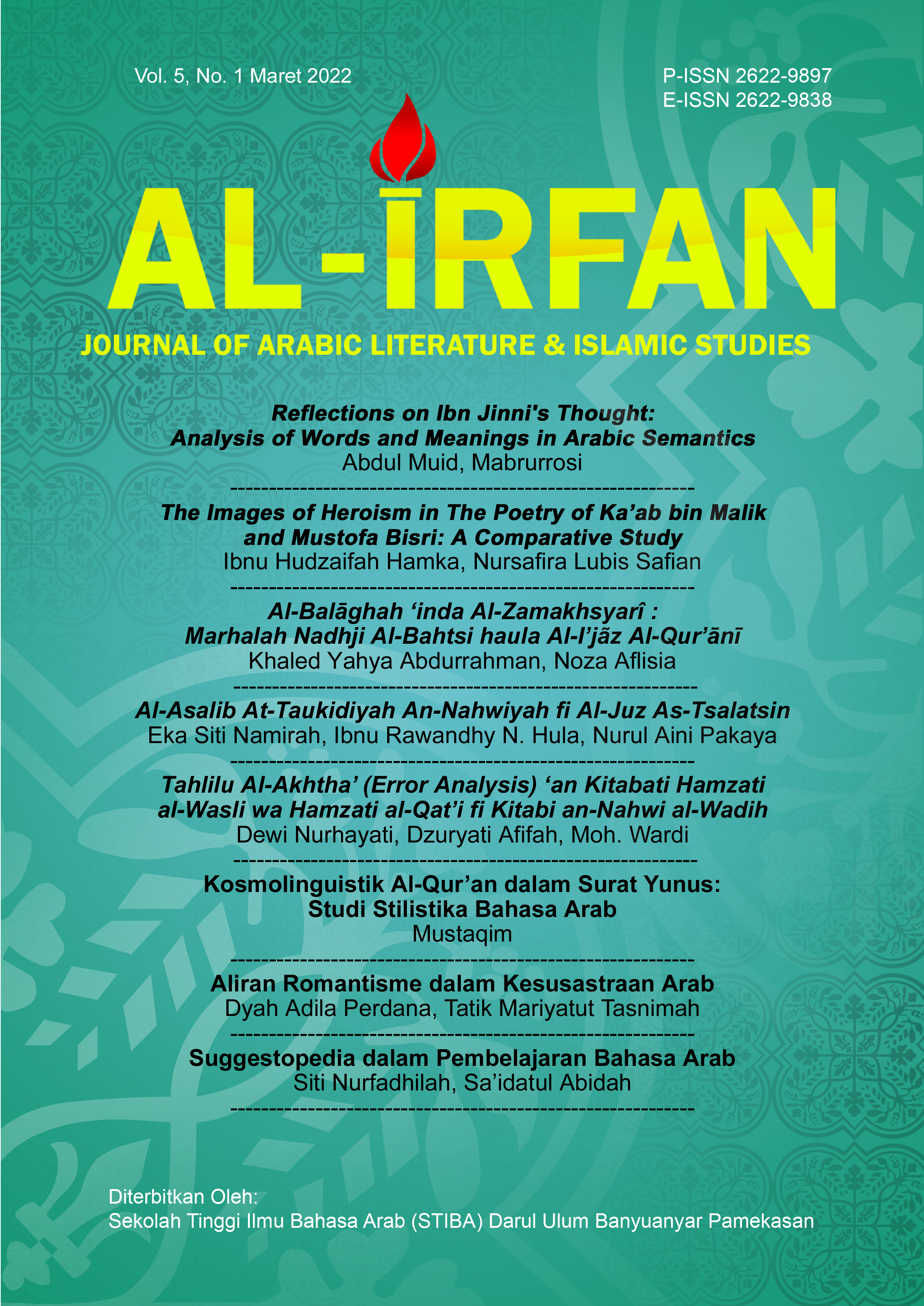Al-BalÄghah ‘inda Al-Zamakhsyarî
Marhalah Nadhji Al-Bahtsi haula Al-I’jãz Al-Qur’ÄnÄ«
DOI:
https://doi.org/10.36835/alirfan.v5i1.5460Keywords:
Rhetoric, Zamakhshari, Miracles, Qur’anAbstract
Zamakhshari's effort is limited to the practical aspect, and highlights the role of the science of eloquence in preparing the interpreter of the Book of God, and whether Zamakhshari added new to the rhetorical standards, and models of his interpretation showing his use of rhetorical rules in understanding the Book of God. This research is a desk research. The data obtained is processed by content analysis techniques. As for the results of the research, Zamakhshari is the pillar sought by the science of interpretation; Because it is his goal and purpose, just as the science of rhetoric that Zamakhshari employed in revealing the miracle of the Qur’an is closely related to the science of semantics. Zamakhshari tries to interpret the Qur’an by organizing the vocabulary of the material into a meaning that brings it together in a single structure within a single context. He draws attention to the effect of speech systems on the meaning, so he looks at the Qur’an with the look of the verified examiner, and accordingly, the meaning is interpreted and interpreted. It provokes a dialogue in one aspect, paving the way for another dialogue to move to another verse, and he thus follows the approach of Al-Jurjani in using dialogue to reach the desired goal. He cites poetry in his explanations, and poetry was an important aspect for him to infer the validity of his interpretations.References
ابراهيم، معتز. (٢٠١٩). البلاغة ÙÙŠ تÙسير الزمخشري، الموسوعة العربية الشاملة، (mosoah.com)
بركة، عبدالغني Ù…Øمد سعد. (١٩٨٩). الإعجاز القرآني وجوهه وأسراره، القاهرة : مكتبة وهبة.
توÙيق، زاهره. (Ù¢Ù Ù Ù¢). الأوجه البلاغية والدلالية ÙÙŠ تÙسير الكشا٠للزمخشري ØŒ رسالة ماجستير.
Ùارس، خير الدين بن Ù…Øمود بن Ù…Øمد بن علي بن. (Ù¢Ù Ù Ù¢). الزركلي، الأعلام الناشر : دار العلم للملايين الطبعة، الخامسة عشر.
موسى، Ù…Øمد Øسين أبو. (د.س). البلاغة القرآنية ÙÙŠ تÙسير الزمخشري وأثرها ÙÙŠ الدراسات البلاغية، القاهرة : دار الÙكر العربي.
Aflisia, N. (2017). Musykilah Tarjamah al-Lughah al-’Arabiyyah Ila al-Lughah al-Indonesiyyah. ARABIYATUNA : Jurnal Bahasa Arab. https://doi.org/10.29240/jba.v1i1.198
Aflisia, N., Rini, R., & Yul, W. (2021). DirÄsah ‘an Al-IbdÄl fÄ« ‘Ilmi Al-Sharfi. Lughawiyyat: Jurnal Pendidikan Bahasa Dan Sastra Arab, 4(1), 24–39. https://doi.org/10.38073/LUGHAWIYYAT.V4I1.420
Alfiyah, A. (2018). Kajian Kitab Al-Kasyaf Karya Zamakhsyari. In Jurnal Ilmu Al Quran dan Tafsir (Vol. 1). Retrieved from http://ejournal.iai-tabah.ac.id/index.php/Alfurqon/article/view/206
Ali Maghfur UIN Sunan Ampel, A., & Yani, J. A. (2020). Al-MuḥassinÄt al-Lafẓiyyah wa al-Maʽnawiyyah fÄ« MaqÄmÄt al-ZamakhsyarÄ«: DirÄsah BalÄgiyah. JILSA (Jurnal Ilmu Linguistik Dan Sastra Arab), 4(1), 48–70. https://doi.org/10.15642/JILSA.2020.4.1.48-70
Ridho, A. R. (2019). Analisis Kajian Morfologi Az-Zmakhsyari dalam Tafsir Al-Kasysyaf. El-’Umdah, 2(1), 16–37. https://doi.org/10.20414/el-umdah.v2i1.910
Supriadi. (2014). Karakteristik Penafsiran Zamakhsyari Terhadap Ayat-ayat Fasik. Jurnal Asy-Syukriyyah, 12(April), 72–97. https://doi.org/10.36769/ASY.V12I1.57
Wahyuni, R. (2019). Al-Ushul Al-Khamsah Perspektif Zamakhsyari Studi Kritis Penafsiran Ayat-Ayat Terkait Al-Ushul Al-Khamsah dalam Tafsir Al-Kasysyaf (Pascasarjana Institut Ilmu Al-Qur’an (IIQ) Jakarta). Retrieved from http://repository.iiq.ac.id//handle/123456789/200
Downloads
Published
How to Cite
Issue
Section
License
Copyright (c) 2022 Khaled Yahya Abdurrahman, Noza Aflisia

This work is licensed under a Creative Commons Attribution 4.0 International License.
Lisensi :
Al-Irfan: Journal of Arabic Literature and Islamic Studies is published under conditions Creative Commons Attribution 4.0 International License / CC BY 4.0 This license permits anyone to copy and redistribute this material in any form or format, modify, modify, and make derivative works of this material for any purpose, including commercial purposes, so long as they credit the author for the original work.











